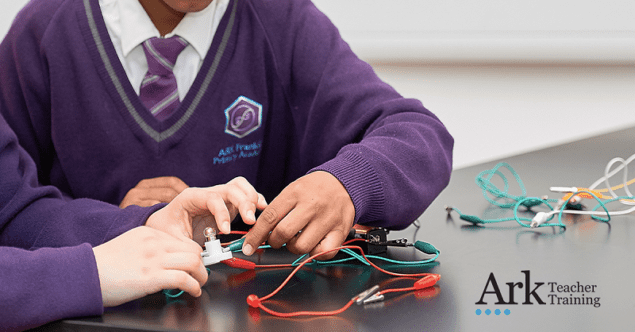Ark Teacher Training wants to attract more physics graduates to support its mission of delivering better educational outcomes for children in disadvantaged communities.
This article was updated on 5 May 2021.

Physics graduates, it seems, remain resolutely unconvinced by the prospects of life in the classroom. The numbers don’t lie. Official data from the Department for Education (DfE) in England show that there were 41,472 new entrants to postgraduate initial teacher-training (ITT) courses in the academic year 2019/20 – an uptick on the postgraduate trainees in 2019/20. Yet while subjects like biology, history and geography exceeded recruitment targets specified in the so-called Teacher Supply Model (TSM) – a government forecast of the number of postgraduate ITT entrants needed to provide sustainable numbers of qualified teachers – it’s notable that recruitment performance against TSM targets was well off in other subjects such as physics (bottom of the pile at just 45%).
Drill down into the data and the situation is most acute for schools serving areas of socioeconomic disadvantage with a history of academic underachievement. “More than one in ten teachers from the most disadvantaged secondary schools leave to teach in other schools – about twice the proportion who make the same move from the least disadvantaged schools,” notes the DfE’s Teacher Recruitment and Retention Strategy (2019). Those higher levels of turnover, argues the DfE, only serve to amplify the problems of attracting subject specialists – not least physicists – to schools within low-income communities.
It’s all about outcomes
Ark Teacher Training is seeking to redress that imbalance with a proactive recruitment strategy to attract more physics graduates into the teaching profession. That’s particularly significant because the specialist training provider is an offshoot of Ark, an international education charity with a network of 38 schools across England – each of those schools serving an economically disadvantaged catchment in Birmingham, Hastings, London or Portsmouth.
“The national shortage of physics teachers is deeply unfair – and especially so in schools serving the most disadvantaged children,” explains Isabel Instone, senior tutor and head of curriculum and assessment at Ark Teacher Training. “We’re targeting physics graduates, in particular, to come and train with Ark because we believe every child deserves to be taught by a subject expert.”
Put simply, says Instone, physicists are best placed to paint the “bigger picture” on their subject, highlighting connections between science and the real world that will inspire children to pursue further study, and ultimately careers, in science and engineering. “With Ark,” she adds, “physics graduates will be part of a network of teachers and schools focused squarely on bridging the attainment gap and delivering better educational outcomes for disadvantaged children.”
Teaching the teachers
One physicist who’s experienced the Ark Teacher Training programme first hand is Phil Entwhistle at Ark Elvin Academy, a secondary school for students aged 11–16 in Brent, North London. After completing a physics degree at the University of Exeter in 2014, Entwhistle spent a gap year in the Canadian Rockies (think snowboarding and mountain-biking) before a two-year stint working for the British Red Cross.

“You’re in the classroom from day one,” explains Entwhistle. “For me, that’s one of the big selling points of Ark – the training is research-based but very much practice-centric. At the same time, there’s a fantastic level of support from your professional development tutor, your coach [an experienced teacher] and your peer network of fellow trainees.”
That support kicks in upfront with a two-week summer school that brings all new trainees together for an introduction to the Ark programme and the principles of great teaching. “The summer school is all about orientation,” notes Entwhistle. “The main focus is on what we call ‘climate for learning’ – how to manage behaviour in a classroom and practising what to do in various scenarios. The key to getting good quickly as a teacher is having control of the room.”
Continuous improvement
Once formal training gets under way, student teachers from different schools in the Ark network get together for weekly training sessions led by a specialist tutor. The tutor’s role is to support and develop teaching best practice, though the peer interaction and sharing of collective experience are equally important – whether that’s on matters of general pedagogy, how to plan a great lesson, or the strategies and language needed to teach difficult subjects and concepts.
In the classroom, meanwhile, each trainee is assigned a coach, an experienced teacher who they will work with and learn from on a daily basis. From the outset, trainees will teach some classes independently, while others involve “team-teaching” with their coach – managing a small chunk of the lessons and observing the rest of the time. “Seeing what experienced teachers do and how they do it has tremendous value,” says Entwhistle. However, that dynamic shifts, and ultimately flips, as the training year progresses, with trainees assuming the lead role on teaching duties and the coach acting more in an observer/adviser capacity.
To a large degree, the coach’s role is to fast-track continuous improvement of the trainee’s classroom practice. “The coach will observe at least one of your lessons each week and highlight an aspect of your approach that will have the biggest impact if you develop it,” explains Entwhistle. “That bite-sized action step then becomes your main focus for the following week. Incremental changes, week by week, that add up to something much more over time.”
After successful completion of the Ark Teacher Training programme, which comes with qualified teacher status (QTS) and a postgraduate certificate in education (PGCE), Entwhistle took up a newly qualified teacher (NQT) post in science at Ark Elvin Academy. After the NQT year, and becoming a fully qualified teacher, he progressed to lead physics teachers, a role that involves oversight and development of the school’s physics curriculum as well as coaching Ark trainee teachers.
- To find out more, register for the Ark Teacher Training webinars here.
Reimagining best practice in the classroom
Ark Teacher Training launched in 2013, an offshoot of parent group Ark’s established network of schools across England. Since then, the organization has seen over 550 graduates complete its teacher training programme, all of them earning qualified teacher status (QTS) and a postgraduate certificate in education (PGCE) accredited by Goldsmiths, University of London. A further 150 student teachers in the 2019/20 cohort are working towards QTS later this year. Isabel Instone, senior tutor and head of curriculum and assessment at Ark Teacher Training, talked to Physics World about the guiding principles of Ark’s training model.

What does your role at Ark Teacher Training involve?
Assessment and moderation are a big part of what I do. I’m responsible for designing procedures to check how well our trainees are progressing through the training year – and, if necessary, to support any students who might be struggling. The curriculum aspect is more geeky – so looking at what and how we teach our trainees, also ways we can improve the training. One aspect of that is to work with specialist subject leads to come up with innovative ways to teach difficult-to-grasp subjects – for example, electricity and energy – without introducing common misconceptions.
What differentiates Ark versus other teacher-training providers?
We have a consistency of approach – the language we use, our training methods – to provide the best possible support to teachers during their training year and the early years of their career. It’s in these formative stages when teachers make the most significant improvements to their daily practice. We talk a lot about the “get it, do it” gap for trainees. It’s not enough to get the theory or to see what great teaching practice looks like. You have to be able to deliver in the classroom.
How do you help trainees to raise the bar in terms of best practice?
We use videos to inform almost every training session – more often than not using lessons filmed in our schools and delivered by former trainee teachers within the Ark programme. It’s a fantastic exercise to deconstruct at a granular level what makes a lesson good – and the steps needed to plan and deliver that lesson. Using those insights, our trainees will practice their own lesson in front of their peers, getting group feedback along the way, so that they can implement in the classroom the next day. It’s too important to practise new teaching strategies for the first time in front of the children.
How do you ensure the programme continues to develop?
We have a continuous improvement mindset at Ark and take a lot of cues from trainees, mentors and senior leaders within our schools. Several recent changes are linked to trainee wellbeing and workplace – for example, getting into good habits early on when it comes to work/life balance.
Why should prospective candidates choose Ark?
The programme ensures there’s no gap between what is taught – the theory – and what the trainees do in the classroom. Our aim is to make them as effective as possible as quickly as possible. Longer term, we want our trainee teachers to build a career in the Ark network and ultimately move into leadership positions in our schools. We support trainees who successfully complete their training year [and earn their QTS/PGCE] to secure an NQT role in their current school or another school in the Ark network.



